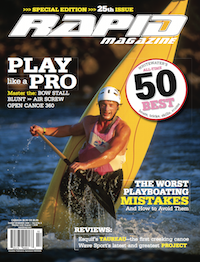I first learned of the writer, poet and filmmaker Robert Perkins when I saw his classic film Into the Great Solitude, a startling chronicle of his 1987 solo paddle down Nunavut’s Back River during which he comes unwound, seemingly losing grip with reality as he travels further and further north. It was as disturbing as it was magical. Perkins’ film made me renew my vow to paddle an Arctic river, but it also convinced me I wouldn’t try it alone.
I met Perkins a year or two later at a film festival reception where champagne bubbled in fluted glasses, waiters bustled in their tuxedoes and canoeists fidgeted in their suits and ties. he was a gracious guest of honour, introducing himself to everyone as he circulated around the room. I hoped my three minutes of small talk would revolve around writing, the Arctic and paddling. I wanted him to know we had much in common.
Instead, we talked about splitting firewood. More deserving guests threw daggers at my back as the party wound down and we continued to talk about axes, wood and swing techniques. he seemed genuinely intrigued by my winter business of selling firewood and we dissected the visceral appeal of frosty mornings and working hard. I left pleased we had made a connection, but it was years before I understood why we spoke so long about swinging axes, and not paddles.
Perkin’s 1996 book Talking to Angels is comprised of three autobiographical stories. the middle one is about his summer of self-imposed Arctic exile on the Northwest Territories’ Baillie River. He lived in a converted meat locker with a weather radio, roaming wildlife and breathlessly spacious beauty as his only distractions. His lyrical writing penetrates the sublime violence of a northern spring break-up and the life and death truths apparent in the carcass of a scavenged musk ox.
This middle section is most popular with canoeists, but the first third of the book prefaces his time in the Arctic. It documents his decline into mental illness as a young man. Written against a backdrop of the wider insanity of 1968—an escalating Vietnam war and the assassinations of Martin luther King Jr. and Robert Kennedy—Perkins writes of living in an Alice in Wonderland world where nothing makes sense but the feeling that he has “lost his keys,” and can’t find them no matter how hard he looks. He portrays himself as the only sane observer in a maximum security ward and writes, in dripping metaphors, that he’s floating adrift, swimming in darkness, sinking, drowning… his escape attempt ends with him knocking on the hospital’s back door, too tired and drugged to get away.
When Perkins was released, he knew where he had to go:
“I went north, to the tundra. whenever I could, I traveled into wilderness… I preferred the straight- forward fear I felt and the physical dangers I faced to dealing with family and other people. slowly I stopped leaning on nature and began to just look, to see. she was all I could trust.”
The haze of confusion and madness of the first story is set in clear contrast to the clarity of the Arctic air and stillness of the tundra. Perkins found sanity by paddling northern rivers, by being alone and facing his fears. out there he connected different parts of his life—he found his keys—and he prepared to re-enter life at home.
It only takes a glimpse of daily headlines to see that there is as much insanity and confusion in our world today as in the one Perkins peeked out at from his hospital window in 1968. Geopolitical paranoia and manipulation, routine road rage and the vacuous Canadian Idol seem to be disparate things, but together they are enough to make us want to take our paddles to the wilderness and seek the same clarity Perkins found on the tundra.
Re-reading his book now I realize why we hit it off so well at the film festival. I found the answer in an incidental detail that most would have passed right over. Patients in the hospital were rewarded for good behaviour by being allowed to choose a special activity to pass the time. Many chose cooking or extra television time. Perkins chose to chop firewood.
Jeff Jackson gave up his firewood business to become a professor of outdoor adventure at Algonquin College in Pembroke, Ontario.




